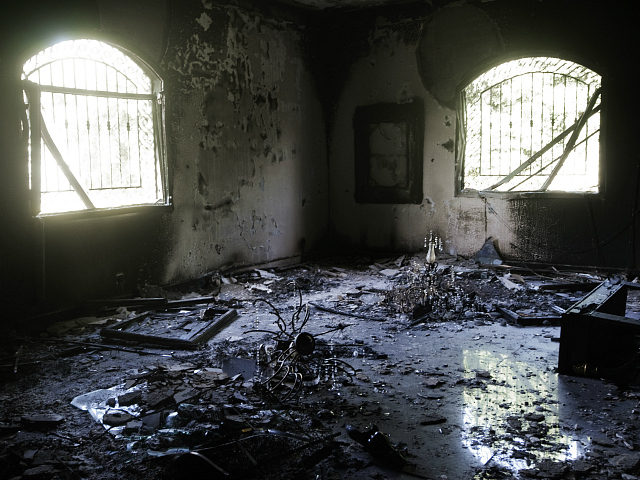Testifying for six hours at the trial of alleged Benghazi attack mastermind Ahmed Abu Khattala on Tuesday, diplomatic security agents Scott Wickland and David Ubben described the last moments of Ambassador Chris Stevens and their own miraculous survival.
“As bodyguard to U.S. Ambassador J. Christopher Stevens, Wickland was the last person to see him and an aide alive as they tried to escape a burning mission villa,” the Washington Post reports. “Wickland also was at the wheel of an armored car evacuating U.S. security personnel that ran a gauntlet of hostile fire to the CIA annex, only to have the attack trail them and mortar rounds kill two more Americans and wound one of Wickland’s close friends just feet away from him on a rooftop.”
CNN relates Wickland’s testimony that he first realized the consulate was in danger when he “heard chanting down the street from the mission, and then calls of ‘Allah Akbar.’” Soon after he got Stevens and Smith to the safe room, he heard gunfire, explosions, and “bloodcurdling screams” over his radio.
As a horde of some 80 militants overran the diplomatic compound in Benghazi, Wickland tried to protect the ambassador and communications specialist Sean Smith in a closet that had been converted into a safe room.
He said the attackers used a rocket-propelled grenade to blast open the doors to the villa. They retreated, but the building caught fire, as described by the Washington Post:
With one hand on his M-4 rifle and the other on Stevens, Wickland said he last saw the ambassador and Smith crawling behind him as they tried to reach a bedroom with a window. ‘To this day, I don’t even know where they went,” Wickland said, his voice catching with emotion during testimony. “I was right next to him and then, that’s it.”
Wickland climbed out of the window alone, then reentered the compound four times to try to find the men without success, vomiting from the smoke, coming under the fire when he was outside, and calling on his radio for help, he said.
Finally, he climbed to the roof, pulling up a ladder after him, testifying, “That’s when I knew [Stevens and Smith] were dead.”
The UK Daily Mail quotes Ambassador Stevens’ last words to Wickland: “When I die, you need to pick up my gun and keep fighting.”
Wickland testified the attack began so abruptly that he never had a chance to put his shoes on. He was barefoot and covered in soot when other agents found him.
His nightmare was not over yet because, after the agents reluctantly concluded Ambassador Stevens was lost and fell back from the consulate, their cars were hit by a hail of bullets and bombs from a mob of about 90 Libyan attackers. Wickland said the car he was driving was hit “hundreds of times” and part of the rear was torn away by an explosion.
The rest is history, as the saying goes: CIA Global Response Staff teams arrived to defend the CIA annex, which was hit by heavy mortar fire, killing former Navy SEALs Tyrone Woods and Glen Doherty.
Wickland testified that Doherty, a trained battlefield medic, checked on him before heading for the rooftop post where he would be killed defending the annex.
“I was pretty grateful for that. He seemed just like a good guy,” said Wickland. “And then right away, he just went up and joined my friends on the roof. Right after that, I hear the explosions happen.”
Also testifying on Tuesday was David Ubben, the State Department security agent who recovered Sean Smith’s body from the American mission. Ubben’s testimony intersected with Wickland’s at several points, including what Ubben described as a “surreal” moment when he locked eyes with a Libyan attacker firing an AK-47 as the vehicle, driven by Wickland, sped past. One of the Libyan’s bullets hit the car window right next to Ubben’s face.
Ubben recalled speaking to a Libyan government official to whom he did not trust enough to disclose his location and a Libyan militia leader contracted for security at the mission who improbably claimed his group killed many of the attackers, even though he didn’t respond to phone calls for help and was nowhere to be seen during the attack.
Ubben was severely wounded in the mortar attack that killed Woods and Doherty. “Dave, the mortar had basically ripped off his leg. He had shrapnel in his face. It had ripped off part of his arm. I didn’t think Dave was going to live,” Wickland said at the trial.
Abu Khattala, a militia leader who spent years in prison under the regime of slain dictator Moammar Qaddafi, is accused of planning the attack and assembling the weapons needed. Prosecutors further contend he was directly involved in the assault, personally carrying some of the fuel canisters used to set the fire that killed Stevens and Smith. They said he was motivated by “hatred for Americans” and “extremist ideology.”
The defense insists he was a “Libyan patriot” who helped overthrow Qaddafi and was only present at the American consulate on the night of September 11, 2012, because he wanted to “see what was going on.” The defense also credits Khattala with trying to protect other onlookers from stray gunfire.

COMMENTS
Please let us know if you're having issues with commenting.